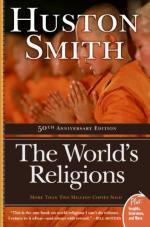|
This section contains 297 words (approx. 1 page at 400 words per page) |

|
Chapter IX, The Primal Religions, Orality, Place, and Time, Summary and Analysis
Literacy was unknown to the primal religions where sacred legends were carefully guarded against encroachments. The spoken word has rhythms and accentuations that make the theater of primal religion a heightened experience. This distinction of orality defies the assumption of the need for the written word where human memory is at the very heart of the religion itself. The entire library of oral tradition is committed to heart, word perfect, and passed down through generations. The resulting impact is ongoing and empowering to its recipients. It involves poetry and music that become an integral part of tribal life. Unlike writing, which can blur the distinctions between the important and the peripheral, orality embeds the essential into the mind.
The primal religion understands place as opposed...
(read more from the Chapter IX, The Primal Religions, Orality, Place, and Time, Summary)
|
This section contains 297 words (approx. 1 page at 400 words per page) |

|




